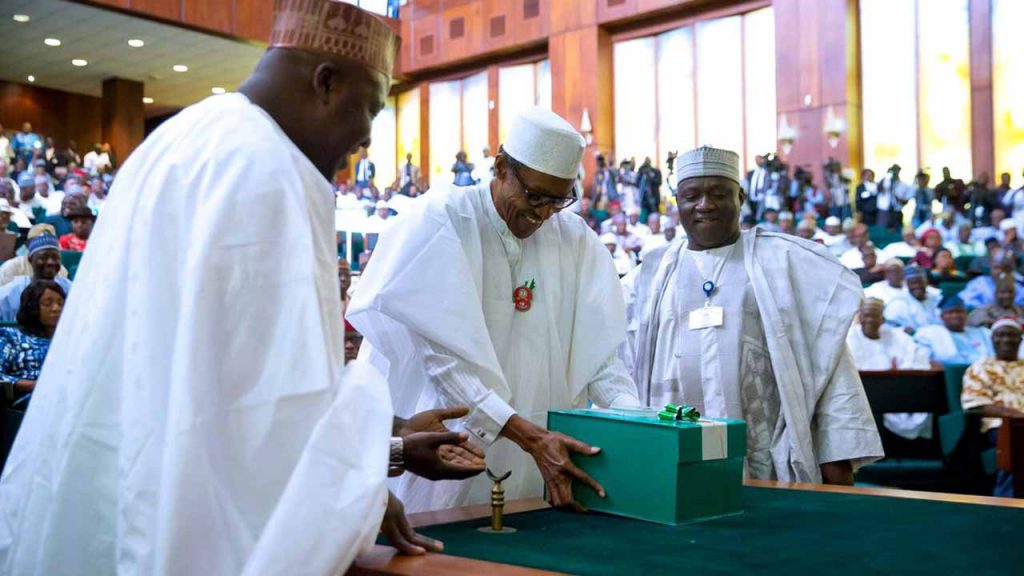Reactions from the various segments of the Nigerian economy operators have indicated some level of optimism that the country’s economy would be improved with a full implementation of the 2018 budget.
But some sections of the experts expressed concern that not only has implementation been the bane of all good budgets, the 2018 budget still has some weak points.
They were reacting to the various provisions of the 2018 Appropriation Bill, tagged ‘Budget of Consolidation’ presented to the National Assembly by President Muhammadu Buhari two days ago.
While positive consensus centred on the allocations to capital expenditure, CAPEX, most uncomplimentary remarks centred on lack of faith in government’s poor implementation record over the years, lamenting thta 2018 budget would likely suffer same fate.
Lead Partner, BudgIT
Mr. Oluseun Onigbinde, Lead Partner, BudgIT, a leading budget advocacy organisation based in Lagos, said “ BudgIT welcomes the relatively early presentation of the 2018 budget and accepts that the economy requires significant fiscal injections to sustain and accelerate economic growth. Significant investment in Infrastructure, education and agriculture, among others, are also important if the country’s hope of diversifying government revenue and export base is to be sustained.
‘‘Improvement in tax administration, which the government hopes to push ahead with in 2018 as highlighted in Mr. President’s budget presentation speech, is also welcome. Equally important is the need to end the cycle of poverty through some form of social intervention.
“In all, the proposed 2018 budget of N8.6 trillion and its guiding framework captures a majority of the objectives and philosophy that scholars, researchers and economists are likely to think about when the need for fiscal injections arises.
‘‘The philosophy of the current government to spend big due to the relatively slow economic activities is welcome and clearly understood. As such, the capital expenditure allocation of N2.42trillion is huge in nominal terms when compared to previous budgets. Given that almost all capital expenditure allocation will be financed primarily by debts, we hope that the line items in the budget will reflect such.
“Also, we believe the revenue projection of N6.6trillion is very optimistic, considering that the total retained revenue of the federal government, including non-oil and oil-related revenue in 2015 and 2016, was N2.8trillion and N2.6trillion respectively.
‘‘Federal government’s non-oil revenue in the first six months of 2017 stood at N587billion, and no significant facts suggest the figure would double or triple in approaching the new fiscal year. Oil revenue for the 2018 fiscal year is projected at N2.332trillion while the biggest bracket of government expected revenue is projected to come from the non-oil sector at N4.16trillion.
“We accept that the budget benchmark is of $45 per barrel is within the band, but there has to be excessive caution in keeping the peace of the Niger Delta, which is a crucial element in ensuring optimal production.
‘‘Overall, the budget proposal will need proper interrogation from all stakeholders, and analysis will be better when the line items are released to the public in a timely manner in line with the fiscal responsibility act that the president swore to uphold.
‘‘Also, given that the biggest proportion of government’s projected revenue will come from the non-oil sector, government will need to be more transparent about government finances, including releasing more information on actual recoveries from loot purportedly returned by former public officials.”
Nigerian Shippers’ Council
The Executive Secretary of the Nigerian Shippers’ Council, NSC, Mr. Hassan Bello, said : “ The N8.6 trillion proposed budget for 2018 is a budget for infrastructural development, a development that will enhance economic growth. The capital aspect of the budget is an indication that more has been allocated to capital expenditure than recurrent which accordingly will see more high ways will be built, more rail lines will be constructed and these will ease the movement of cargoes from the ports.
With more funds allocated for capital projects, the Council is already negotiating with shipping companies on the need to bring down their charges.
“Since rail carries more goods at cheaper rates, it means that the dry ports will work, the Transit Truck Park will work, I am glad about the budget as it will create more employment.
“It shows that the government is focused and ready to develop and upgrade the nation’s infrastructure.”
More opportunities for Insurance industry – CEO, Equity Assurance
Managing Director/CEO Equity Assurance Plc, Mr. Moruf Apampa said : “ Government should ensure that the budget is fully implemented.
“For me, it is about implementation. Once the government fully implements the budget the economy will improve. There could be so much spending next year, so that means so much opportunity for the insurance industry. Not just the insurance industry, the economy will be stimulated. We will have so much in terms of activities. 2019 is an electoral year, so they want to ensure that they spend so much for the year, so that people can see what they have done.
“They want to make significant impact so there will be so much opportunity for us. Maybe Lagos state government will have money then to execute the fourth mainland bridge, Dangote Refinery could come on board in the next couple of years, roads, railways and power projects and so many other projects could come on board. So we will be able to do so much in terms of opportunities for insurers.
“Hence, there is a lot of hope. As at this morning, oil price has gone up to $64, so it is more likely to increase going forward and government will have more money to spend. That is why government is trying to talk to the avengers to calm the militants down because this is not the time to come out. So government should stabilise the economy and let there be lots of implementation of the budget,” Apampa said.
Source: The Vanguard

